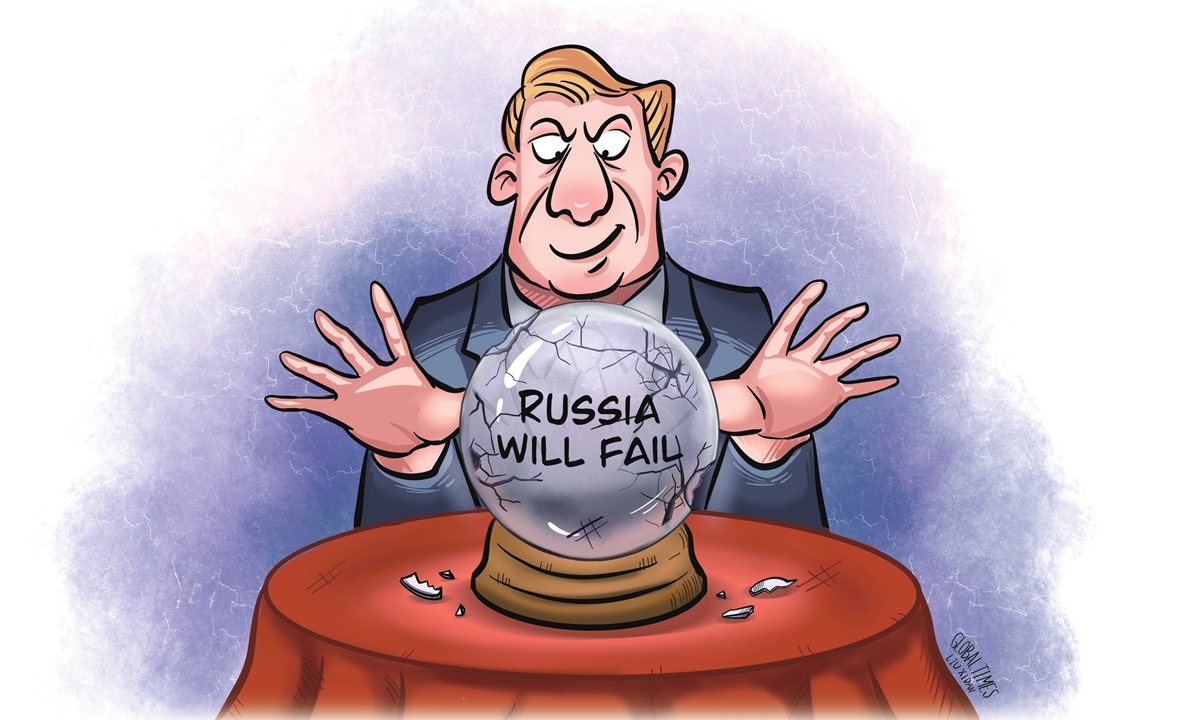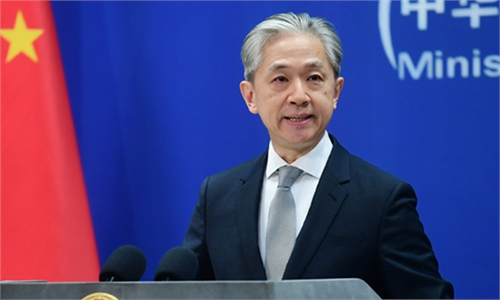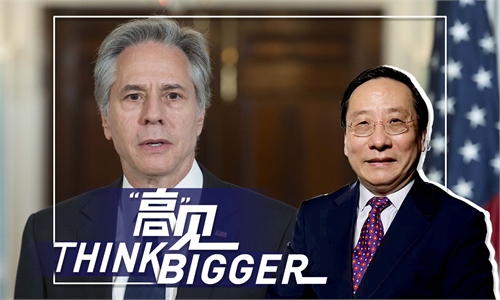Why the West is obsessed with ‘predicting Russia’s failure’ despite the opposite truth

Illustration: Xia Qing/GT
Since its outbreak in 2022, the Russia-Ukraine conflict has been ongoing for two years. Now, evidently, it is entering its latter phase. Russia continues to maintain its advantageous position in the current situation. Can Russia's economy and social mobilization capabilities sustain its current high-pressure situation and support it until the end of the conflict?
The political and academic circles in Russia have given highly optimistic evaluations. They believe that the strong economy ensures that Russia can do more with less, and supports Russia in long-term attrition against the West.
In contrast, Western public opinion, in general, holds a pessimistic view of Russia's prospects. The mainstream public opinion in the West believes that the Western collective has a significant advantage, and Russia will ultimately fail. Recently, the renowned American think tank, the Wilson Center, discussed "Russia's new economic imbalances" and predicted that Russian President Vladimir Putin will "leave Russia in ruins." Foreign Policy also condescendingly tells Putin in the headline that he "should have known his invasion would fail." Such pessimistic remarks about Russia are widespread in Western public opinion, contrasting with Russia's proactive approach on the battlefield, making it seem that the West and the rest of the world are living in parallel universes.
In fact, the "Russia failure" judgment is not a new phenomenon, but rather a cliché. Since the outbreak of the Russia-Ukraine conflict in February 2022, the West has constantly disparaged Russia. Many Western media outlets boldly said that Russia had missed the best chance to win after it failed to quickly take over Kiev. Some even believed that the prolonged war would exacerbate internal dissatisfaction with Putin within Russian society, leading to the internal collapse of the current Russian government.
The West's sanctions against Russia and support for Ukraine over the past two years, aimed at causing great economic and social difficulties in Russia, have been precisely based on the Western judgment that Russia will collapse, and the expectation that there will be opposition forces internally to overthrow Putin. At the same time, the West attempts to incite dissatisfaction among the Russian people with the Putin administration, waiting for the emergence of the next Mikhail Gorbachev, under which the Soviet Union collapsed, within Russia.
However, we see that the facts have not borne this out. Not only has Russia not collapsed, but its socio-economic situation remains stable. Moreover, in the 2024 presidential election, Russian citizens demonstrated strong support for the Russian government. Therefore, we can conclude that the predictions that "Russia will be defeated" and "Putin will be betrayed" are currently baseless.
Nevertheless, Western public opinion continues tirelessly to propagate pessimistic views about Russia, attempting to create the impression that Russia is isolated. This aims to create instability both inside and outside Russia. The West hopes for the emergence of new opposition forces to challenge Putin's leadership, while the US and its allies seek to hype the judgment that "Putin will fail" to encourage other countries friendly or neutral to Russia to switch their position, thus isolating Russia completely.
However, these pessimistic predictions from the West increasingly diverge from reality. Russia still has the upper hand on the battlefield, yet the West spares no effort in spreading the rhetoric that Russia will fail.
Indeed, Russia has encountered numerous problems over the past two years, such as the initial failure of its military intelligence agencies to provide accurate assessments during the early stage of the Russia-Ukraine conflict and disruptions in domestic manufacturing due to the withdrawal of Western companies. Yet, we cannot overlook Russia's ability to swiftly adjust its state apparatus to match its mobilization patterns in the face of difficulties, thereby generating formidable combat strength and endurance.
In contrast, Western countries are not necessarily handling their complex internal issues any better than Russia. As George F. Kennan once argued, "It is rather a question of the degree to which the US can create among the peoples of the world generally the impression of a country which knows what it wants, which is coping successfully with the problems of its internal life and with the responsibilities of a World Power, and which has a spir itual vitality capable of holding its own among the major ideological currents of the time." Evidently, Western public opinion has failed to grasp Kennan's wise words. If Russia can effectively address its internal issues and consolidate societal consensus, then what significance does the prediction of Russia's failure hold?
The author is a scholar from the Shanghai-based China National Institute for SCO International Exchange and Judicial Cooperation. opinion@globaltimes.com.cn


